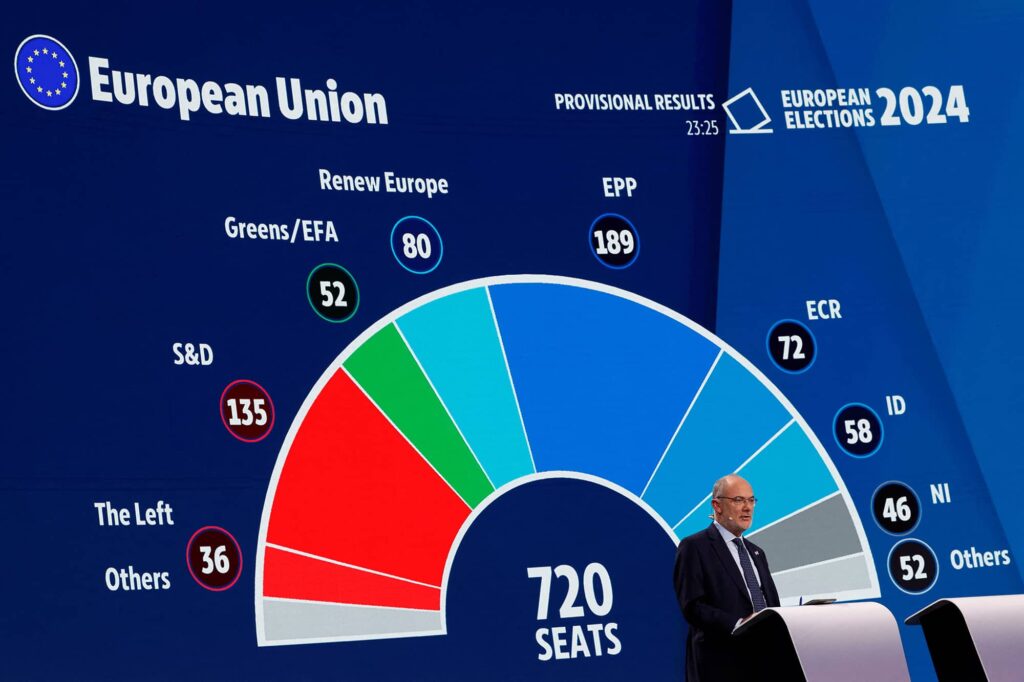The June elections for the European Parliament were more than a setback for Europe’s political establishment. For Germany’s Olaf Scholz and France’s Emmanuel Macron, they were a humiliation. They also contain a warning message for America’s Joe Biden.
Across the continent, right-wing populists scored convincing victories. In France, Marine Le Pen’s National Rally party won 30 percent of the vote, double that of Macron’s Renew party. In Germany, the Alternative for Germany scored 16 percent, despite several recent scandals centering on the Nazi past, and surpassed Scholz’s Social Democratic Party. As it happens, the Alternative for Germany took the most votes from the Christian Democrats and the Social Democrats—about 570,000–testifying to the deep unease, particularly in the former East Germany, with mainstream German parties.
Perhaps the most noteworthy development in Germany was that the Greens plummeted, losing about 30 percent of their voters to the Alternative for Germany. Many of the defectors were under the age of 25. The belief that fear of climate change would prompt German youth to keep voting for the Greens turned out to be a mirage.
Elections to the European Parliament, a body with limited powers, do not always foretell the results of upcoming national elections. These European-wide elections, like some of their predecessors, may turn out to be mainly a protest vote precisely because they are less important. In fact, the governing center-right European People’s Party retained narrow control of the European Parliament, with 184 out of 720 lawmakers. It’s also the case that Hungary’s far-right strongman Prime Minister Viktor Orban took it on the chin, losing support to opposition leader Peter Magyar whose Respect and Freedom party garnered 30 percent of the Hungarian vote, or seven delegates to the European Parliament.
The European political establishment is seeking to put the best face possible on the outcome. “We were determined, we were united, and now we won the European elections,” said Ursula von der Leyen, the president of the European Commission. “Voters have entrusted us with a very strong mandate.”
But the truth is that a specter is haunting Europe—the specter of the nationalist right. At a moment when President Joe Biden, intent on countering former president Donald Trump during his visit to Normandy, invoked a crusade on behalf of democracy against dictatorship, the irony of the European Parliament elections was inescapable. The unmistakable trend is on behalf of the nationalist right, which heads governments in Italy, Slovakia and Hungary and is part of ruling coalitions in Finland and Sweden.

The most immediate result of the elections will be to determine France’s political future, since Macron called for snap elections in their aftermath. “I’ve heard your message, your concerns,” said Macron in response to the election results, “and I won’t leave them unanswered.”
Macron’s gambit may pay off if French voters pause at the prospect of actually installing Le Pen and her cronies in power. At worst, a new period of cohabitation could ensue in which Macron loses control over domestic policy but retains his prerogatives in foreign affairs. He will doubtless seize upon the upcoming Olympics Games to bolster his case for France’s global engagement and power rather than a turning inward. A flush of national pride might help restore his party’s battered political fortunes.
Unlike Macron, Scholz is resisting calls for a quick federal election, which he would more than likely lose. The key question will be whether his “traffic light” coalition of Free Democrats (yellow), Social Democrats (red), and Greens can survive much longer or succumb to internal bickering and outside political pressures.
Even as the continent heads in one direction, Great Britain, as is its wont, seems to be moving in another. The Tory party is headed for a crushing defeat now that its hapless Prime Minister Rishi Sunak has called a snap election for July 4. Labour leader Sir Keir Starmer looks like a sure bet as the next PM. But speculation is also mounting that Nigel Farage’s Reform UK party could surpass the Tories. In sum, Britain could prove no more exempt to populist fervor than its former EU brethren.
If the 2024 European parliamentary elections are as much of a harbinger for Donald Trump as was the 2016 Brexit referendum, then he is in for smooth sailing in November.
Europe, like the US, has become a battleground between the political establishment and the rise of populist parties. In Europe, the populists denounce political Islam, illegal immigration, environmental spending and Davos corporate elites. In some cases, they tend to be sympathetic to Russia (which has been bribing European politicians and supporting right-wing movements).
As Malte Lehming, a columnist for the Berlin daily Der Tagesspiegel, observes, it’s too simplistic to brand voters for populist parties as fascists, which merely serves to demonize them. Their issues must be addressed by the establishment.
So much for the vision of Europe as a mecca of cosmopolitan liberalism. It is illiberalism that is on the rise. Indeed, as Washington Post columnist Ishaan Tharoor reports, “the European Union, long hailed as a post-national bastion of liberal values, is not just hospitable to illiberal nationalism, but possibly a crucible for a new age of rightwing politics in the West.” Biden would do well to take note. Trump surely has.

